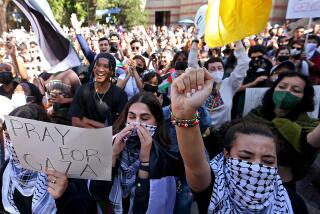U.S. Islamic Leaders Condemn Bombing, Brace for Backlash : Religion: They say they will ask authorities to step up patrols around key mosques and Muslim centers, including in Los Angeles, Garden Grove.
As word spread that a suspect had been arrested Thursday in New York in the bombing of the World Trade Center, Islamic leaders across the country braced for a backlash against Muslims.
They quickly condemned the bombing that last week claimed at least five lives and said that the attack--one of the largest terrorist acts in the United States--was alien to their faith and could not be tolerated in a “civilized society.”
The suspect was identified as Mohammed A. Salameh, 25, who authorities said was affiliated with a mosque in New Jersey led by a blind cleric who advocates the overthrow of the Egyptian government and other secular governments in the Middle East. The man who was convicted in connection with the 1990 slaying of Rabbi Meir Kahane was also a follower of the cleric, Sheik Omar Abdul Rahman.
But even as Islamic leaders condemned the assault on the World Trade Center, they said that they fear possible repercussions and said that they would urge local law enforcement authorities to step up patrols around key Islamic centers in Los Angeles and in Garden Grove.
“In the past people get very emotional, and they react against local (Muslim) communities, bomb the mosques and (Islamic) centers or confront and harass Muslims. One has to be very careful,” said Muzammil Siddiqi, the nationally known spiritual director at the Islamic Center of Orange County, located in Garden Grove.
In Los Angeles at the Islamic Center of Southern California, chairman Maher Hathout said that he has asked Los Angeles Police Chief Willie L. Williams for additional surveillance.
“During trying times like this we are always afraid of the wackos and we’ve asked them to take extra precautions,” Hathout said.
Hathout said that the precautions would be especially warranted because attendance was up at mosques and Islamic centers during the current observation of Ramadan, a month of fasting and reflection. An LAPD spokesman confirmed that it would step up surveillance of the center.
“The concern is there. We believe that anyone who has any analytical mind will know that (Islamic faith) has nothing to do with that, but we are always concerned about the crazy ones who don’t know heads from tails,” Hathout said.
Islamic leaders issued ardent pleas urging that the estimated 6 million Muslims in the United States, including up to 1.5 million in Southern California, not be unfairly branded as extremists.
They said that Muslims have been stereotyped by the media and others. Too often, they said, all Muslims are seen as extremists or “fundamentalists.” They said that such characterizations are inaccurate, unfair and helped contribute to misunderstandings and repercussions.
Rami Ramadan, director of the American-Arab Council, in a letter to New York Mayor David N. Dinkins, said that the organization was adding $50,000 to the city’s $200,000 reward for information leading to the bombers’ capture, UPI reported.
“We, as a targeted and politically stigmatized community, have a lot to fear when hate and violence is propagated and advocated,” Ramadan said.
M.T. Mehdi, of the National Council on Islamic Affairs, said that, if the suspect is guilty of the bombing, “his action should not be attributed to Islam or to the Muslim people.”
Mehdi, who issued a written statement before Salameh was identified by authorities, called the bombing “an individual act of a deranged person . . . (with) no conspiratorial connection.”
The editor of The Minaret, a Los Angeles Islamic magazine, pointedly referred to the current standoff in Waco, Tex., between federal agents and members of the Branch Davidian cult. Four federal agents were killed last Sunday attempting to arrest cult leader David Koresh, who claims he is Jesus Christ.
“As David Koresh is not representative of Christianity, whoever that guy (Salameh) is should not be seen as representative of Islam or Muslims,” said editor Aslam Abdullah.
Jamal Badawi, who teaches Islamic religious traditions at St. Mary’s University in Halifax, Nova Scotia, and lectures widely on Islam, said in a telephone interview Thursday that terrorist acts are forbidden by the faith.
“Any practicing Muslims would definitely be against any acts of terrorism by anyone--Jews, Christians or Muslims,” Badawi said.
He said that the concept of jihad (which means “striving”) has been widely misunderstood in the West and is incorrectly translated as “holy war.” Jihad refers to striving for excellence on one of several levels. The first two involve personal and individual spiritual and intellectual efforts to become a better Muslim. The second addresses efforts to improve society.
The third and last level involves self-defense or fighting against oppression. But, Badawi said, this is a last resort. Further, he said, even on the battlefield, Islam teaches that civilians, women, children, noncombatants and religious people of other faiths are not to be touched.
Badawi and other Muslims interviewed Thursday strongly objected to terms such as “Islamic extremist” or “Muslim fundamentalist.”
They said that one seldom hears of “Jewish terrorists,” or “Christian terrorists.” This, they said, is how it should be. Terrorist acts by individual Jews or Christians should not be seen as acts of Jewish or Christian faith. They said that the same should hold true for Islam.
“It’s quite honest to admit that among Muslims, just like among Christians and Jews, there are elements that are extremist. They are elements on the fringe,” said Badawi. He and others also noted that Arab Muslims represents about a fifth of the world’s estimated 1 billion Muslims. Others are from Malaysia, India, Iran and Turkey.
More to Read
Sign up for Essential California
The most important California stories and recommendations in your inbox every morning.
You may occasionally receive promotional content from the Los Angeles Times.










